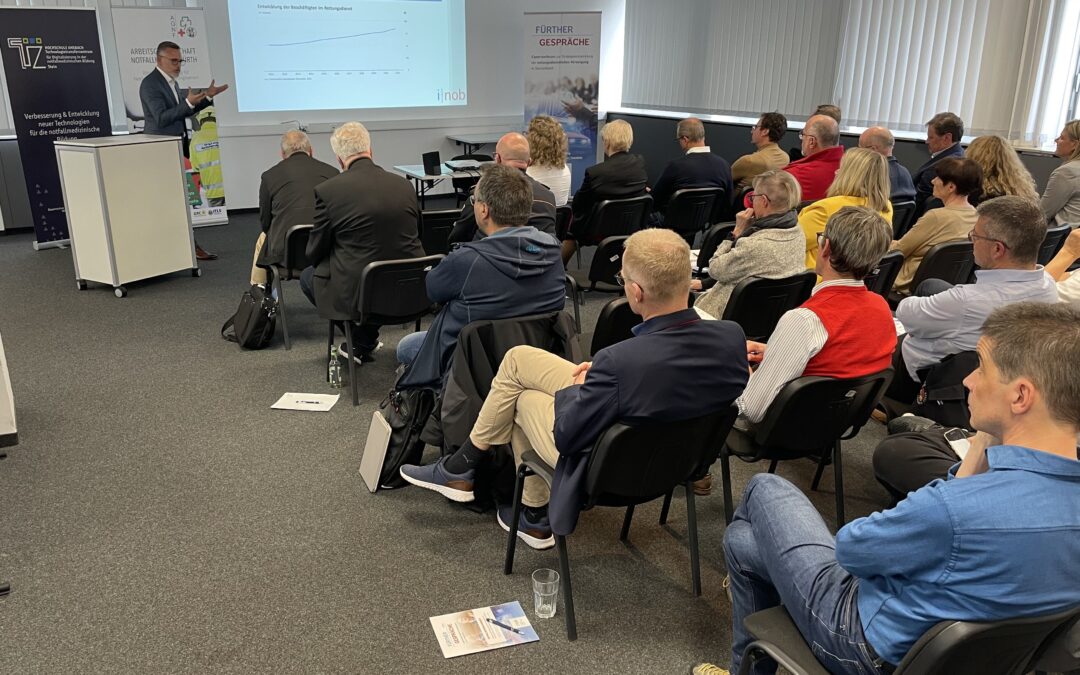On 19.10. the AGNF and the Institute for Emergency Medical Education (INOB) invited guests to discuss the results of the 2nd edition of the expert forum and think tank Fürther Gespräche, which this year focused on the rescue service and its networking with emergency care in hospitals, in the context of the emergency reform and its impact on the region.
The framework for the discussion was provided by expert presentations, which took up in concentrated form the contents of the results paper of the 2nd Fürth Talks, which were organized in spring by the Institute for Emergency Medical Education (INOB), the Fürth Emergency Medicine Working Group (AGNF) and Ansbach University of Applied Sciences.
The results paper is available for download at https://inob.org/fuerther-gespraeche-2024/.
Prof. Dr. Christian K. Lackner, Chairman of the Claus Enneker Foundation, kicked off the event with a talk on the fundamental need for reform and the consequences of reform in emergency and acute medicine. He took a look at other countries and pilot projects that could serve as a model for our healthcare system.
He was followed by Prof. Dr. Harald Dormann, Chief Physician of the Central Emergency Department at Fürth Hospital and Scientific Director at INOB, who described the hospital and emergency reform at the sector transition, focusing in particular on the region and its clinics. He emphasized that there is a need for reform in the qualification system and in the possibilities for case-closing treatment outside the clinics.
After Klaus Meyer, Chairman of the AGNF Board and Managing Director of the INOB, had described the current situation in the rescue service, the complexity and controversial nature of the topic quickly became clear in the first round of discussions that followed.
“The dynamics of the discussions show that with our recommendations for action and the chosen format with open discussion rounds, we have hit a point that is of interest to politicians at local, state and federal level as well as representatives of the healthcare sector,” said Klaus Meyer, pleased with the lively exchange.
For example, Tobias Winkler (MP), Carsten Träger (MP), Petra Guttenberger (MP), Bernd Obst (District Administrator of Fürth), Markus Braun (Mayor of Fürth), Kurt Krömer (First Mayor of Stein), Gökhan Katipoglu (Head of Emergency Services, KV Bayern), Stefan Kornhaas (Head of Rescue Services, BRK Fürth), Dr. Manfred Wagner (Medical Director, Fürth Hospital) and Prof. Dr. Sascha Müller-Feuerstein (President of Ansbach University of Applied Sciences) took part in the event. Manfred Wagner (Medical Director, Fürth Hospital) and Prof. Dr. Sascha Müller-Feuerstein (President of Ansbach University of Applied Sciences) took part in the event.
The challenges of the integrated control center at the Nuremberg Fire Department were then highlighted by its department head and chairman of the control center association, Marc Gistrichovsky. Under the vision of “One Call fits All”, he presented optimization options such as an upstream online self-assessment for patients, synchronized query systems and the exchange of health data between the 112 and 116117 numbers.
In the concluding discussion round, for example, questions from politicians were answered and their impulses and experiences from everyday life in the region were taken up.
Thank you very much for the great interest and the lively exchange!
